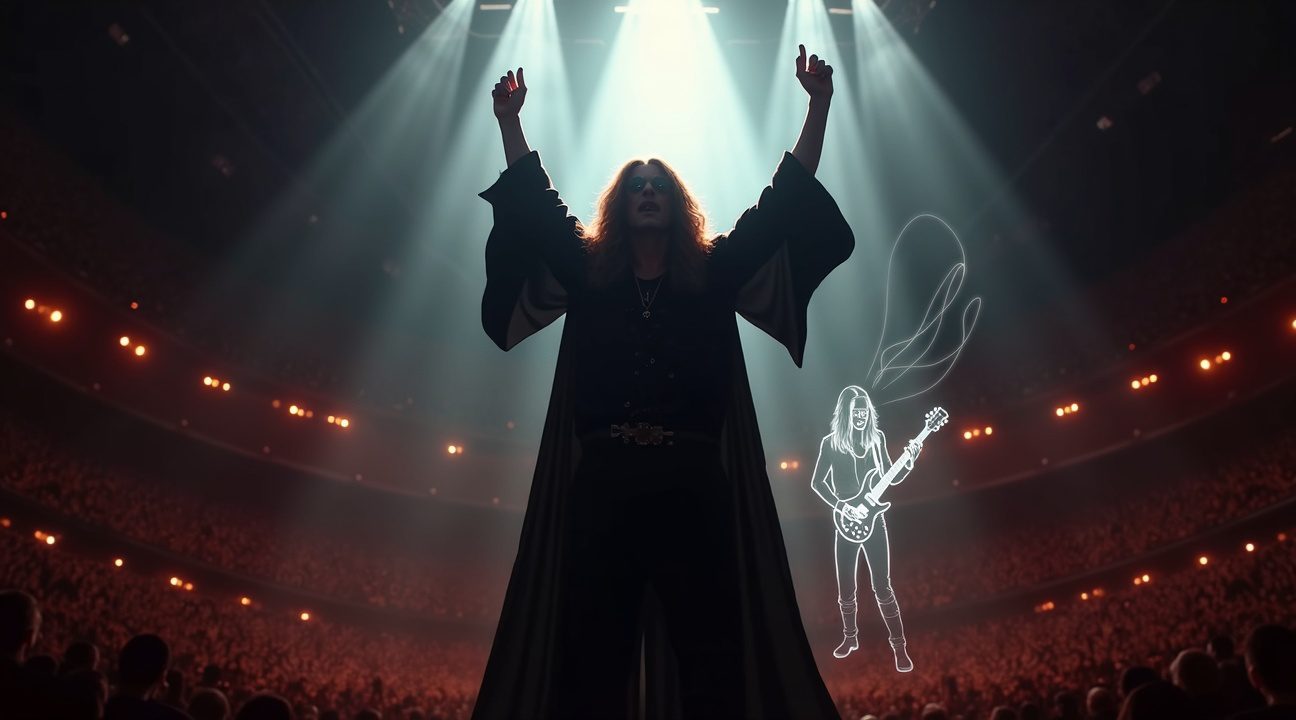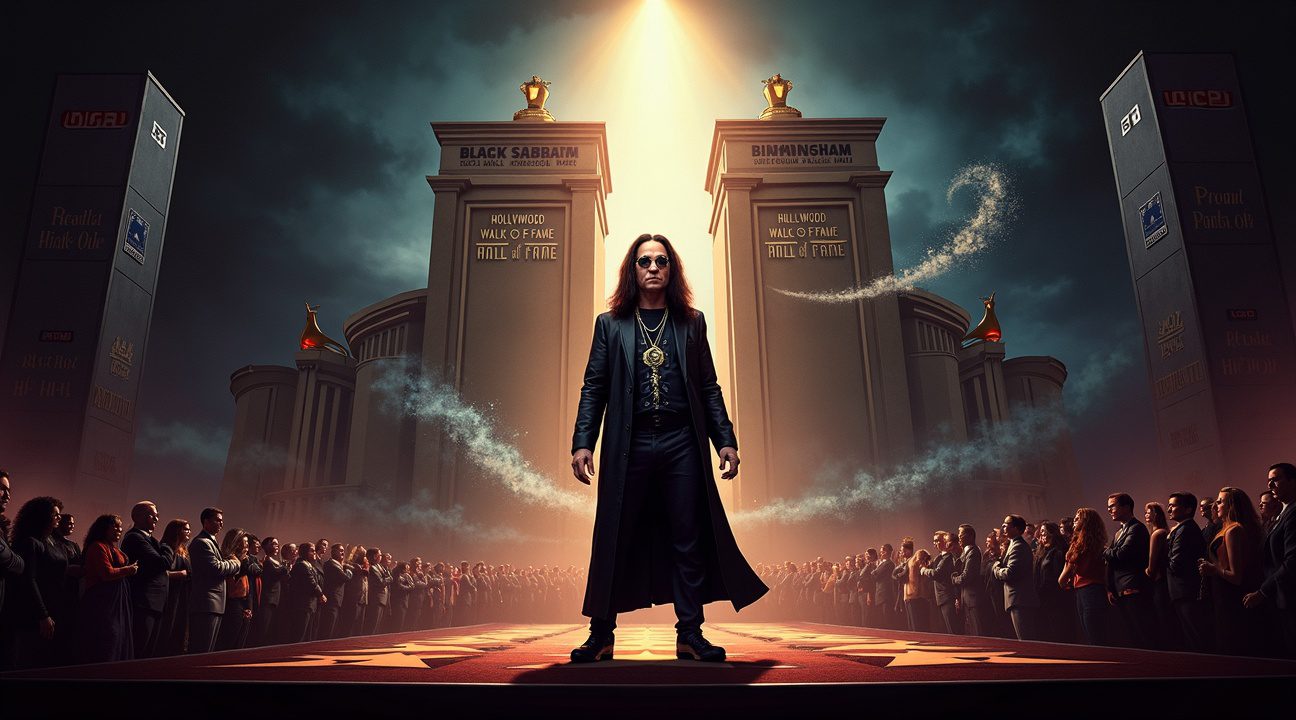Ozzy Osbourne’s influence on rock music stretches far beyond his position as Black Sabbath’s frontman, encompassing the invention of heavy metal, a revolutionary solo career, and cultural impact that transformed him from the “Prince of Darkness” into a beloved mainstream icon.
His journey from Birmingham’s working-class streets to dual Rock & Roll Hall of Fame inductions demonstrates how one artist’s vision can reshape an entire musical landscape while inspiring generations of musicians across multiple genres.
Key Takeaways
- Heavy Metal Pioneer: Co-founded Black Sabbath in 1968 and created the heavy metal genre through groundbreaking albums like Black Sabbath (1970) and Paranoid (1970), establishing the dark, heavy sound that became the blueprint for countless metal bands.
- Solo Career Success: Transformed his 1979 firing from Black Sabbath into a triumphant solo career, selling over 100 million albums worldwide and winning Grammy Awards as recently as 2023.
- Industry Innovation: Created Ozzfest in 1996, a touring festival that launched major metal acts like Slipknot, System of a Down, and Disturbed while revitalizing the genre’s commercial viability.
- Cultural Crossover: Achieved mainstream appeal through MTV’s The Osbournes reality show, becoming “America’s Dad” and proving that authentic family dynamics could be as compelling as stage performances.
- Mental Health Advocacy: Openly discussed addiction, mental health struggles, and Parkinson’s disease diagnosis, helping destigmatize these conversations in rock culture and encouraging other artists to seek help.
Musical Foundations and Black Sabbath Legacy
Heavy metal wouldn’t exist without Osbourne’s contributions to rock music. Black Sabbath emerged from Birmingham’s industrial landscape in 1968, creating a sound that diverged dramatically from the flower power movement dominating popular music. The band’s self-titled debut album in 1970 introduced audiences to downtuned guitars, occult-influenced lyrics, and apocalyptic themes that established heavy metal’s foundation.
Osbourne’s vocal style became the template for metal singers worldwide. His operatic wails and menacing delivery created an atmosphere of danger and excitement that previous rock vocalists hadn’t achieved. Songs like Iron Man and War Pigs demonstrated his ability to convey both vulnerability and power, establishing emotional range as essential for metal frontmen.
The Prince of Darkness Persona
The Prince of Darkness persona developed organically from Osbourne’s stage presence and theatrical instincts. His infamous bat-biting incident in 1982 crystallized his reputation as rock’s ultimate wild man. This public image served as calculated marketing while reflecting genuine unpredictability that kept audiences captivated.
Solo Career and Musical Evolution
Solo career success followed Osbourne’s controversial departure from Black Sabbath in 1979. Blizzard of Ozz (1980) proved that his songwriting abilities and stage charisma could sustain independent success. Working with guitarist Randy Rhoads elevated his musical sophistication while maintaining the heavy sound that defined his reputation.
Festivals and Business Innovations
Ozzfest transformed metal’s commercial prospects during the late 1990s. The touring festival provided emerging bands with massive exposure while proving that metal could generate significant revenue. Major acts like Slipknot and Tool gained mainstream recognition through Ozzfest appearances, validating Osbourne’s ability to identify and promote talent.
Television Stardom and Cultural Impact
Television success through The Osbournes revealed humanizing qualities beneath the dark persona. Audiences witnessed genuine family moments between a devoted husband and father struggling with everyday challenges. This authentic portrayal made Osbourne relatable to demographics who previously dismissed him as frightening or irrelevant.
Championing Mental Health
Mental health advocacy represents perhaps Osbourne’s most significant recent contribution to rock culture. His candid discussions about addiction recovery, depression, and Parkinson’s disease encouraged other musicians to address similar struggles publicly. This openness helped normalize conversations about mental health in an industry known for toxic masculinity and emotional suppression.
Adaptation and Technological Progress
Technological adaptation kept Osbourne relevant across multiple decades. Early adoption of MTV’s visual culture amplified his theatrical performances for television audiences. Later embracing streaming platforms and social media maintained his connection with younger generations while preserving his legacy for longtime fans.
International Influence and Genre Expansion
International influence spread heavy metal globally through Osbourne’s touring and recording activities. His willingness to perform in emerging markets introduced metal to cultures that had limited exposure to Western rock music. This global reach established heavy metal as a truly international phenomenon rather than a purely Anglo-American genre.
Guitar Virtuosos and Sonic Brilliance
Guitar player collaborations elevated Osbourne’s musical credibility throughout his career. Randy Rhoads brought classical influences that expanded metal’s harmonic vocabulary. Later partnerships with Jake E. Lee, Zakk Wylde, and other virtuosos maintained high musical standards while allowing different stylistic influences to enter his sound.
Strategic Business Acumen
Business acumen protected Osbourne’s artistic independence while maximizing commercial opportunities. Strategic partnerships with major labels provided distribution power without compromising creative control. Merchandise development and licensing agreements created multiple revenue streams that supported extended touring and high-production recording projects.
Enduring Influence on Legacy Artists
Legacy artists frequently cite Osbourne as a primary influence on their musical development. Metallica, Iron Maiden, and countless other metal bands acknowledge his pioneering contributions to their sound and stage presence. This influence extends beyond metal into alternative rock, grunge, and other genres that incorporated heavy elements into their artistic approach.
Resilience Amid Health Challenges
Health challenges haven’t diminished Osbourne’s commitment to performing and recording. Recent Parkinson’s diagnosis prompted concerns about career continuation, but his determination to maintain musical activity demonstrates professional dedication that transcends physical limitations. Farewell tour announcements suggest awareness of mortality while emphasizing the importance of connecting with fans while still possible.
A Cultural Bridge Between Worlds
Cultural bridge-building occurred naturally through Osbourne’s authentic personality and musical evolution. His ability to appeal to both underground metal fans and mainstream audiences created opportunities for heavy music to enter popular culture without compromising artistic integrity. This crossover success paved the way for other metal artists to achieve widespread recognition.
Studio Innovation and Legacy
Studio innovation marked many of Osbourne’s most successful recordings. Experimental approaches to guitar sounds, vocal effects, and production techniques pushed metal’s sonic boundaries while maintaining accessibility. His willingness to embrace new recording technologies helped keep his sound contemporary across different musical eras.
Lasting Impact on Rock Music
Osbourne’s influence continues shaping modern rock music through direct artistic impact and industry precedents he established. His career demonstrates how authentic artistic vision combined with strategic career management can sustain relevance across multiple decades. Future metal artists still study his approach to performance, recording, and fan engagement as essential elements of successful heavy music careers.
To explore more about Osbourne’s legacy, visit the official Ozzy Osbourne website for music, tour updates, and exclusive content.
How Black Sabbath Invented Heavy Metal and Changed Rock Forever
Four working-class musicians from Birmingham, England, changed rock music forever when they formed Black Sabbath in 1968. Ozzy Osbourne, Tony Iommi, Geezer Butler, and Bill Ward didn’t just create another rock band—they birthed an entirely new genre that would influence countless musicians for decades to come.
The Birth of Heavy Metal Through Groundbreaking Albums
Black Sabbath’s self-titled debut album in 1970 marked the beginning of heavy metal as we know it. The album’s opening track featured a haunting tritone riff that immediately separated the band from their blues-rock contemporaries. This wasn’t the optimistic psychedelia that dominated the late 1960s—this was something darker and more powerful.
Later that same year, the band released Paranoid, which solidified their position as pioneers of the genre. The album included several tracks that became defining moments in heavy metal:
- “Paranoid” showcased the band’s ability to create catchy yet heavy compositions
- “War Pigs” delivered biting social commentary over crushing riffs
- “Iron Man” demonstrated how science fiction themes could blend with heavy music
Paranoid topped the UK charts and proved that audiences craved this new, heavier sound. The success wasn’t just commercial—it was cultural, as Black Sabbath addressed the social anxieties and existential fears that many young people felt during the turbulent early 1970s.
The band’s musical innovations became the template for heavy metal. Tony Iommi’s down-tuned, heavily distorted guitar created a sound that was both menacing and melodic. Ozzy’s haunting vocal delivery perfectly complemented these dark musical arrangements, while the rhythm section provided the thunderous foundation that made the music feel genuinely heavy.
Black Sabbath’s influence extends far beyond their Birmingham origins or even their impressive sales figures of over 70 million albums worldwide. Their willingness to explore taboo subjects through dark lyrics set them apart from the peace-and-love messaging of their era. They created space for rock music to be introspective, angry, and even frightening.
The genre they invented continues to evolve today, with modern bands still drawing inspiration from those early Black Sabbath recordings. Even as Ozzy Osbourne aims for one more album, his foundational work with Black Sabbath remains the blueprint that countless metal bands follow. The band’s legacy proves that sometimes the most revolutionary art comes from the most unlikely places—in this case, an industrial city in the English Midlands where four young men decided to make music as heavy as their surroundings.
From Fired to Legendary: Ozzy’s Solo Career Triumph
When Black Sabbath fired Ozzy Osbourne in 1979, few could have predicted that this setback would launch one of rock’s most iconic solo careers. What appeared to be a career-ending moment instead became the catalyst for extraordinary artistic and commercial success that would span decades.
The Foundation of Solo Success
Osbourne’s solo career took flight with the release of Blizzard of Ozz in 1980, an album that established his distinctive sound outside Black Sabbath’s heavy framework. This debut showcased tracks like Crazy Train and Mr. Crowley, which quickly evolved into rock anthems that still resonate with audiences today. The follow-up album Diary of a Madman in 1981 solidified his position as a formidable solo artist, proving his dismissal from Black Sabbath was their loss.
His partnership with guitarist Randy Rhoads became the defining element of these early solo records. Rhoads brought classical influences and technical virtuosity that elevated Osbourne’s theatrical vocals to new heights. This collaboration created a sound that was both accessible and sophisticated, appealing to metal purists while attracting mainstream rock fans.
Commercial Impact and Lasting Recognition
The numbers tell the story of Osbourne’s remarkable solo achievement. Combined with his Black Sabbath sales, his solo discography has contributed to over 100 million albums sold worldwide. This commercial success demonstrates how he transformed from a fired band member into a global rock icon through sheer determination and artistic vision.
Recognition for his solo work continues well into his later career. In 2023, Osbourne won two Grammy Awards for his solo efforts, proving that his relevance extends far beyond nostalgia. These recent accolades highlight how his music continues to connect with new generations while maintaining respect from industry peers.
The trajectory from his Black Sabbath dismissal to solo stardom illustrates how adversity can fuel creativity. His willingness to experiment with new sounds while maintaining his signature style created a template that countless rock artists have followed. Even today, as Ozzy Osbourne aims for one more album and tour, his influence on rock music remains undeniable, with each new project adding to a legacy that began with what seemed like professional disaster but became legendary triumph.

Hall of Fame Status and Unprecedented Recognition Across Decades
Ozzy Osbourne’s official recognition reached its apex with dual inductions into the Rock & Roll Hall of Fame — first as part of Black Sabbath in 2006, then as a solo artist in 2024. This extraordinary double honor places him among an elite group of musicians whose contributions transcended any single project or era. The Rock and Roll Hall of Fame recognition acknowledged both his foundational role in creating heavy metal with Black Sabbath and his successful reinvention as a solo performer who brought the genre into mainstream consciousness.
Beyond hall of fame status, Osbourne collected an impressive array of honors that reflected his cultural impact. He received stars on both the Hollywood Walk of Fame and Birmingham Walk of Stars, cementing his legacy in the entertainment capitals that shaped his career. The 2015 Ivor Novello Award for Lifetime Achievement represented recognition from his peers in the songwriting community, acknowledging the compositional craftsmanship behind the theatrical spectacle.
Record-Breaking Achievements and Cross-Genre Influence
Osbourne’s influence extended far beyond traditional accolades. In 2010, he set a Guinness World Record by leading the world’s largest and loudest heavy metal scream, demonstrating that even decades into his career, he continued pushing boundaries. This achievement captured the essence of his career — combining spectacle with genuine musical innovation.
His cross-genre influence became undeniable as artists across multiple musical styles cited his impact. Musicians in metal, punk, grunge, pop, and hip-hop acknowledged Osbourne’s role in shaping their artistic vision. This widespread recognition demonstrated how the Prince of Darkness transcended heavy metal’s traditional boundaries, influencing artists who might never pick up a guitar but understood the power of his rebellious spirit.
Legacy Cemented Through Tributes
Following Osbourne’s death in July 2025 at age 76, the music community’s response revealed the true scope of his impact. Major artists including Alice Cooper, Foo Fighters, and Motley Crue delivered heartfelt tributes that highlighted his untouchable status as a “rock ‘n’ roll legend” and the “Godfather of Metal.” These tributes weren’t mere professional courtesies — they represented genuine admiration from musicians who understood how Osbourne’s career paved the way for their own success.
The consistency of recognition throughout his career, from Grammy Awards to industry honors, reflected an artist whose influence never waned. Each accolade represented a different aspect of his contribution: technical innovation, cultural impact, and the ability to inspire generations of musicians who followed in his footsteps.

Ozzfest: Building the Next Generation of Metal Giants
I can’t overstate the revolutionary impact Ozzfest had on heavy metal’s landscape when Ozzy and Sharon Osbourne launched this groundbreaking touring music festival in 1996. This wasn’t just another concert series – it became the cornerstone that sustained metal’s commercial viability during a critical period when the genre needed fresh life and new platforms for emerging bands.
Launching Pad for Metal Icons
Ozzfest served as the ultimate launching pad for bands that would define metal for decades to come. The festival’s lineup strategy proved brilliant, pairing established acts with hungry newcomers who were ready to prove their worth on the biggest stages.
- Slipknot gained massive exposure through their Ozzfest appearances, transforming from underground darlings into mainstream metal powerhouses.
- System of a Down similarly used the festival as a springboard, building the fanbase that would eventually carry them to multi-platinum success.
- Disturbed also benefited enormously from their Ozzfest inclusion, with the festival helping them reach audiences they never could have accessed independently.
Sharon Osbourne’s vision for the festival extended beyond simple entertainment – she created a comprehensive ecosystem where emerging bands could learn from veterans while building their own devoted followings. The festival’s structure allowed newer acts to share bills with established headliners, creating mentorship opportunities that shaped the next generation of metal giants.
Cultural and Commercial Phenomenon
The numbers tell an incredible story about Ozzfest’s influence on the heavy metal community. Drawing hundreds of thousands of attendees annually through its run until 2010, the festival became both a financial juggernaut and a cultural landmark that validated metal’s staying power. Festival attendance consistently broke records, proving that metal wasn’t fading but actually experiencing a remarkable resurgence.
Ozzfest’s success came at a perfect time for the genre. During the late 1990s and 2000s, metal faced challenges from alternative rock and emerging genres, but this festival demonstrated that heavy music still commanded massive audiences and serious commercial potential. The festival created a template that other promoters would follow, showing how specialized festivals could thrive by serving dedicated fan communities.
The festival’s legacy extends far beyond ticket sales or album promotion. It created a sense of unity within metal culture, bringing together fans from different subgenres under one massive tent. Veterans like Ozzy could pass the torch to newer acts while maintaining their own relevance, and Ozzy’s continued influence on upcoming generations of metalheads remained strong throughout Ozzfest’s entire run.

The Prince of Darkness Becomes America’s Dad: Reality TV Revolution
Ozzy Osbourne’s transformation from heavy metal’s most notorious figure into America’s beloved dad happened through an unlikely medium: reality television. When MTV launched The Osbournes in 2002, viewers witnessed something unprecedented – the man who once bit the head off a bat struggling to operate his remote control and being lovingly bossed around by his family.
The show shattered cable television records, drawing millions of viewers who couldn’t get enough of the Osbourne family’s chaotic daily life. MTV had struck gold by capturing the genuine dynamics between Ozzy, his wife Sharon Osbourne, and their children Jack Osbourne and Kelly. The series ran for four successful seasons until 2005, fundamentally changing how audiences perceived both reality television and celebrity culture.
What made The Osbournes revolutionary wasn’t just its record-breaking viewership numbers – it was how the show humanized one of rock’s most enigmatic figures. Viewers watched Ozzy fumble with technology, deal with his dogs’ misbehavior, and navigate typical family disagreements. The contrast between his stage persona as the Prince of Darkness and his bumbling, affectionate father figure at home created television magic that resonated across demographics.
Family Legacy in Entertainment
The success of The Osbournes launched a new chapter in the family’s entertainment careers that extended far beyond Ozzy’s musical achievements. Sharon Osbourne leveraged her newfound fame into hosting opportunities and became a prominent television personality in her own right. Jack Osbourne developed his own television career, eventually collaborating with his father on travel shows.
This family dynamic led to several follow-up projects that capitalized on their authentic chemistry:
- Ozzy & Jack’s World Detour (2016–2018) featured the father-son duo traveling together and exploring historical sites
- The Osbournes Want to Believe (2020–2021) combined family banter with paranormal investigations
- Various guest appearances and specials that kept the Osbourne name prominent in popular culture
The reality TV revolution that The Osbournes helped establish changed the entertainment landscape permanently. Celebrity families became content goldmines, and the show’s format influenced countless similar programs. The series proved that audiences craved authentic glimpses into famous lives, even when those glimpses revealed mundane moments and family squabbles.
Ozzy’s television success also complemented his ongoing musical career in unexpected ways. His continued work on new albums benefited from the expanded fanbase that reality TV brought him. Younger viewers who might never have discovered his music through traditional channels became fans after watching his family antics on screen.
The cultural impact of this television phase in Ozzy’s career can’t be overstated. The show transformed him from a niche heavy metal icon into a mainstream cultural figure who appealed to multiple generations. Grandparents who once considered his music dangerous found themselves charmed by his obvious love for his family and his endearingly confused reactions to modern life.
Reality television gave Ozzy Osbourne something that decades of legendary musical performances couldn’t: relatability. The Prince of Darkness became a father figure that millions of Americans invited into their living rooms weekly, creating a unique bond between performer and audience that transcended traditional entertainment boundaries. This transformation represents one of the most successful celebrity reinventions in entertainment history, proving that authentic family dynamics can be just as compelling as any stage performance.
https://www.youtube.com/watch?v=EX9iXpZxgUI

Surviving Demons: How Personal Struggles Shaped Rock’s Most Resilient Icon
Ozzy Osbourne’s career trajectory reads like a survival manual for the rock and roll lifestyle. His openness about addiction, mental health battles, and physical ailments has transformed him from a controversial figure into an unlikely beacon of hope for millions facing similar struggles.
The Prince of Darkness hasn’t hidden his demons from public view. Throughout decades of performing, Osbourne has candidly discussed his alcohol and drug dependencies, turning his personal battles into teachable moments for fans and fellow artists alike. His willingness to expose his vulnerabilities has shattered the traditional rock star facade that often glorifies destructive behavior without acknowledging its consequences.
Breaking the Silence on Mental Health and Addiction
Osbourne’s public honesty about his struggles has encouraged countless musicians to seek help and speak openly about their own challenges. His transparency regarding therapy, rehabilitation, and the ongoing nature of recovery has normalized conversations about mental health in rock circles where such topics were once considered taboo. Sharon Osbourne’s support and advocacy alongside his journey has further demonstrated that recovery requires both personal commitment and strong support systems.
The musician’s approach to discussing addiction differs significantly from the romanticized narratives often associated with rock excess. Instead of presenting substance abuse as glamorous or artistic, Osbourne has consistently emphasized the destructive nature of addiction and the hard work required for sustained recovery. His message resonates particularly strongly because it comes from someone who achieved massive success while battling these issues.
Physical Resilience and Continued Creativity
Despite receiving a Parkinson’s disease diagnosis and enduring multiple surgeries, Osbourne has maintained his commitment to creating music and connecting with audiences. His determination to continue working despite physical limitations demonstrates remarkable resilience that extends far beyond typical rock star bravado. The diagnosis hasn’t stopped him from pursuing new projects, with recent reports suggesting he’s planning another album and tour.
Osbourne’s approach to managing Parkinson’s disease has brought increased awareness to the condition among rock fans who might not otherwise encounter discussions about neurodegenerative diseases. His public appearances and interviews while managing symptoms have shown that creativity and performance don’t necessarily end with a serious medical diagnosis.
The controversies that have surrounded Osbourne throughout his career often overshadowed his artistic contributions, but his survival and continued relevance have reframed these incidents within a larger narrative of personal growth and redemption. Legal issues, public outbursts, and erratic behavior that once seemed career-ending became part of a complex story about human frailty and the possibility of change.
His influence extends beyond music into broader cultural conversations about aging, health, and the sustainability of rock lifestyles. Younger artists now have an example of someone who lived through the excesses associated with heavy metal culture and emerged with wisdom rather than just cautionary tales. Osbourne’s survival story provides a roadmap for musicians who want longevity without sacrificing authenticity.
The impact of Osbourne’s personal struggles on his music has created some of his most powerful and emotionally resonant work. Songs dealing with addiction, depression, and mortality have connected with audiences who see their own struggles reflected in his lyrics. This connection has helped destigmatize mental health discussions within rock music communities and beyond.
Osbourne’s legacy as a survivor has influenced how the music industry approaches artist wellness and support systems. His example has encouraged record labels, management companies, and venue operators to consider the long-term health of performers rather than simply maximizing short-term profits from destructive behaviors.
The transformation from controversial figure to respected elder statesman illustrates the power of persistence and honest self-reflection. Osbourne’s willingness to confront his demons publicly has created space for other artists to address their own struggles without fear of career damage or loss of credibility within rock music circles.
Sources:


